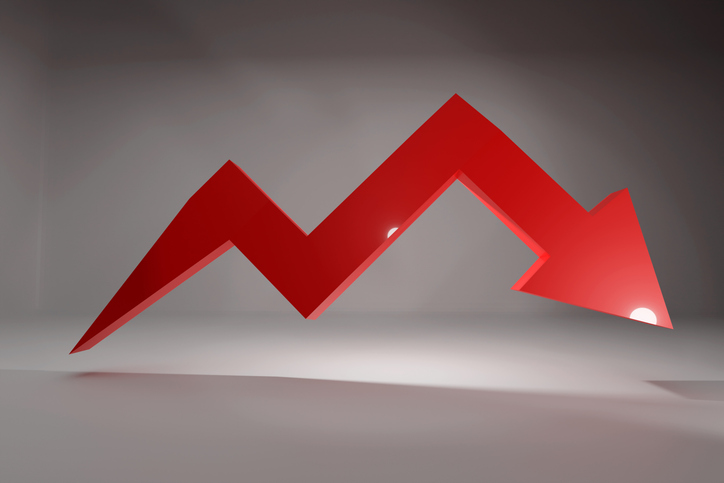Best Bank Stocks to Own as the Fed Hikes Interest Rates
After a sharp rally following the November presidential election, are there any bank stocks with more upside to give on rising rates?

Profit and prosper with the best of Kiplinger's advice on investing, taxes, retirement, personal finance and much more. Delivered daily. Enter your email in the box and click Sign Me Up.
You are now subscribed
Your newsletter sign-up was successful
Want to add more newsletters?

Delivered daily
Kiplinger Today
Profit and prosper with the best of Kiplinger's advice on investing, taxes, retirement, personal finance and much more delivered daily. Smart money moves start here.

Sent five days a week
Kiplinger A Step Ahead
Get practical help to make better financial decisions in your everyday life, from spending to savings on top deals.

Delivered daily
Kiplinger Closing Bell
Get today's biggest financial and investing headlines delivered to your inbox every day the U.S. stock market is open.

Sent twice a week
Kiplinger Adviser Intel
Financial pros across the country share best practices and fresh tactics to preserve and grow your wealth.

Delivered weekly
Kiplinger Tax Tips
Trim your federal and state tax bills with practical tax-planning and tax-cutting strategies.

Sent twice a week
Kiplinger Retirement Tips
Your twice-a-week guide to planning and enjoying a financially secure and richly rewarding retirement

Sent bimonthly.
Kiplinger Adviser Angle
Insights for advisers, wealth managers and other financial professionals.

Sent twice a week
Kiplinger Investing Weekly
Your twice-a-week roundup of promising stocks, funds, companies and industries you should consider, ones you should avoid, and why.

Sent weekly for six weeks
Kiplinger Invest for Retirement
Your step-by-step six-part series on how to invest for retirement, from devising a successful strategy to exactly which investments to choose.
It looks all but certain that the Federal Reserve will raise short-term interest rates when it concludes its two-day meeting on March 15. Bank stocks are traditional beneficiaries of higher interest rates, but they have already rallied sharply since the presidential election in November because investors are giddy about potential corporate tax cuts and financial deregulation. If the central bank does indeed hike short-term rates at its next meeting, are there any bank stocks with more upside to come?
Plenty, says analyst Richard X. Bove of Rafferty Capital Markets. Due to safeguards put in place during the Great Recession, banks are sitting on big piles of cash that are earning very low returns. "In the last 10 years, the government has forced them to raise their cash and securities, so if you get an increase in rates they see a jump in interest income," Bove says. "And there's no cost against that. It's a simple increase in revenue.”
Kiplinger is forecasting three quarter-point rate hikes in 2017. If that holds true, the Fed's target on the federal-funds rate, the rate banks charge each other for overnight loans and a key influencer of other interest rates, would rise to a range of 1.25% to 1.5% by the end of the year. As rates rise, banks, which have heaps of assets already on the books, will prosper without management having to lift a finger. Here are three bank stocks that are especially well positioned to benefit from Fed rate hikes. (Prices and data as of March 10.)
From just $107.88 $24.99 for Kiplinger Personal Finance
Become a smarter, better informed investor. Subscribe from just $107.88 $24.99, plus get up to 4 Special Issues

Sign up for Kiplinger’s Free Newsletters
Profit and prosper with the best of expert advice on investing, taxes, retirement, personal finance and more - straight to your e-mail.
Profit and prosper with the best of expert advice - straight to your e-mail.
Bank of America (BAC, $25.31)
All of the big national banks should get a lift from rising interest rates, but Bank of America stands out. By the bank's own estimates, a one-percentage-point rise in short- and long-term rates would increase its net interest income -- the difference between how much it earns in interest on loans and how much interest it pays on deposits -- by $3.4 billion a year. That's real money even for a bank the size of Bank of America. It has a market value (share price multiplied by number of shares outstanding) of $254 billion and reported net interest income of $10.3 billion in the fourth quarter.
Analysts also like the tailwind Bank of America is getting from expense reductions. "We believe that BAC shareholders will continue to benefit from owning BAC as the Fed increases rates and BAC management executes on the company's cost saving program," says Brian Kleinhanzl of Keefe Bruyette & Woods.
Kleinhanzl has a rating of "outperform" (buy, essentially) on the stock based on the expectation of two additional Fed rate hikes per year in 2017 and 2018. The stock has a dividend yield of 1.1% based on the last four quarters of earnings, which helps sweeten potential returns.
JPMorgan Chase (JPM, $91.28)
After Bank of America, Bove says JPMorgan Chase is best positioned to take advantage of higher interest rates. "They have something like $600 billion in assets that would see an increased return when interest rates go up," the analyst says. And even in the unlikely event that there are no rate increases this year, JPMorgan still expects the Fed's quarter-point hike from December to boost net interest income by approximately $3 billion in 2017. Net interest income totaled about $46 billion last year.
Credit Suisse analyst Susan Roth Katzke has an "outperform" rating on the stock, thanks to above average and improving return on equity, driven in part by higher rates. Return on equity is a key measure of a bank's profitability that shows how much income it generates on each dollar of shareholder equity.
UBS Global Research rates JPMorgan shares at “buy,” noting that the bank is "well positioned to benefit from higher interest rates, moderately faster economic growth, and, possibly, better capital markets.” The nation's largest bank by assets has a market value of $326 billion and offers investors a dividend yield of 2.1%.
Northern Trust (NTRS, $89.30)
Northern Trust is something of a "quasi" bank, Bove says. As a financial holding company, it offers services such as wealth management, private banking and custodial and administrative services for institutions. Nevertheless, it's positioned for much higher returns as rates go up.
The duration of the company's bond portfolio is a bit longer than a year, Bove notes. That’s a short period of time in the world of fixed income and suggests a one percentage point rise in interest rates would only lower the value of its bond portfolio by 1% or so. As rates rise, Northern Trust can quickly replace mature debt with newer bonds carrying higher interest payments. Bove notes that as of Dec. 31, the company had $942 billion in assets under management and $8.5 trillion in assets under custody and administration.
In addition to higher interest income, Northern Trust gets a lift from a rising stock market. "If the equity markets go up, they see a big jump in revenues because they charge based on assets under management or custody and there's no cost against it," Bove says. When stronger economic growth is in the forecast, as it is today, interest rates and stock prices can rise at the same time. The bank has a market value of $20 billion and a dividend yield of 1.7%.
Profit and prosper with the best of Kiplinger's advice on investing, taxes, retirement, personal finance and much more. Delivered daily. Enter your email in the box and click Sign Me Up.

Dan Burrows is Kiplinger's senior investing writer, having joined the publication full time in 2016.
A long-time financial journalist, Dan is a veteran of MarketWatch, CBS MoneyWatch, SmartMoney, InvestorPlace, DailyFinance and other tier 1 national publications. He has written for The Wall Street Journal, Bloomberg and Consumer Reports and his stories have appeared in the New York Daily News, the San Jose Mercury News and Investor's Business Daily, among many other outlets. As a senior writer at AOL's DailyFinance, Dan reported market news from the floor of the New York Stock Exchange.
Once upon a time – before his days as a financial reporter and assistant financial editor at legendary fashion trade paper Women's Wear Daily – Dan worked for Spy magazine, scribbled away at Time Inc. and contributed to Maxim magazine back when lad mags were a thing. He's also written for Esquire magazine's Dubious Achievements Awards.
In his current role at Kiplinger, Dan writes about markets and macroeconomics.
Dan holds a bachelor's degree from Oberlin College and a master's degree from Columbia University.
Disclosure: Dan does not trade individual stocks or securities. He is eternally long the U.S equity market, primarily through tax-advantaged accounts.
-
 5 Vince Lombardi Quotes Retirees Should Live By
5 Vince Lombardi Quotes Retirees Should Live ByThe iconic football coach's philosophy can help retirees win at the game of life.
-
 The $200,000 Olympic 'Pension' is a Retirement Game-Changer for Team USA
The $200,000 Olympic 'Pension' is a Retirement Game-Changer for Team USAThe donation by financier Ross Stevens is meant to be a "retirement program" for Team USA Olympic and Paralympic athletes.
-
 10 Cheapest Places to Live in Colorado
10 Cheapest Places to Live in ColoradoProperty Tax Looking for a cozy cabin near the slopes? These Colorado counties combine reasonable house prices with the state's lowest property tax bills.
-
 If You'd Put $1,000 Into AMD Stock 20 Years Ago, Here's What You'd Have Today
If You'd Put $1,000 Into AMD Stock 20 Years Ago, Here's What You'd Have TodayAdvanced Micro Devices stock is soaring thanks to AI, but as a buy-and-hold bet, it's been a market laggard.
-
 If You'd Put $1,000 Into UPS Stock 20 Years Ago, Here's What You'd Have Today
If You'd Put $1,000 Into UPS Stock 20 Years Ago, Here's What You'd Have TodayUnited Parcel Service stock has been a massive long-term laggard.
-
 Stocks See First Back-to-Back Losses of 2026: Stock Market Today
Stocks See First Back-to-Back Losses of 2026: Stock Market TodayRising geopolitical worries and a continued sell off in financial stocks kept pressure on the main indexes on Wednesday.
-
 Nasdaq Takes a Hit as the Tech Trade Falters: Stock Market Today
Nasdaq Takes a Hit as the Tech Trade Falters: Stock Market TodayThe Dow Jones Industrial Average outperformed on strength in cyclical stocks.
-
 If You'd Put $1,000 Into Lowe's Stock 20 Years Ago, Here's What You'd Have Today
If You'd Put $1,000 Into Lowe's Stock 20 Years Ago, Here's What You'd Have TodayLowe's stock has delivered disappointing returns recently, but it's been a great holding for truly patient investors.
-
 If You'd Put $1,000 Into 3M Stock 20 Years Ago, Here's What You'd Have Today
If You'd Put $1,000 Into 3M Stock 20 Years Ago, Here's What You'd Have TodayMMM stock has been a pit of despair for truly long-term shareholders.
-
 If You'd Put $1,000 Into Coca-Cola Stock 20 Years Ago, Here's What You'd Have Today
If You'd Put $1,000 Into Coca-Cola Stock 20 Years Ago, Here's What You'd Have TodayEven with its reliable dividend growth and generous stock buybacks, Coca-Cola has underperformed the broad market in the long term.
-
 If You Put $1,000 into Qualcomm Stock 20 Years Ago, Here's What You Would Have Today
If You Put $1,000 into Qualcomm Stock 20 Years Ago, Here's What You Would Have TodayQualcomm stock has been a big disappointment for truly long-term investors.